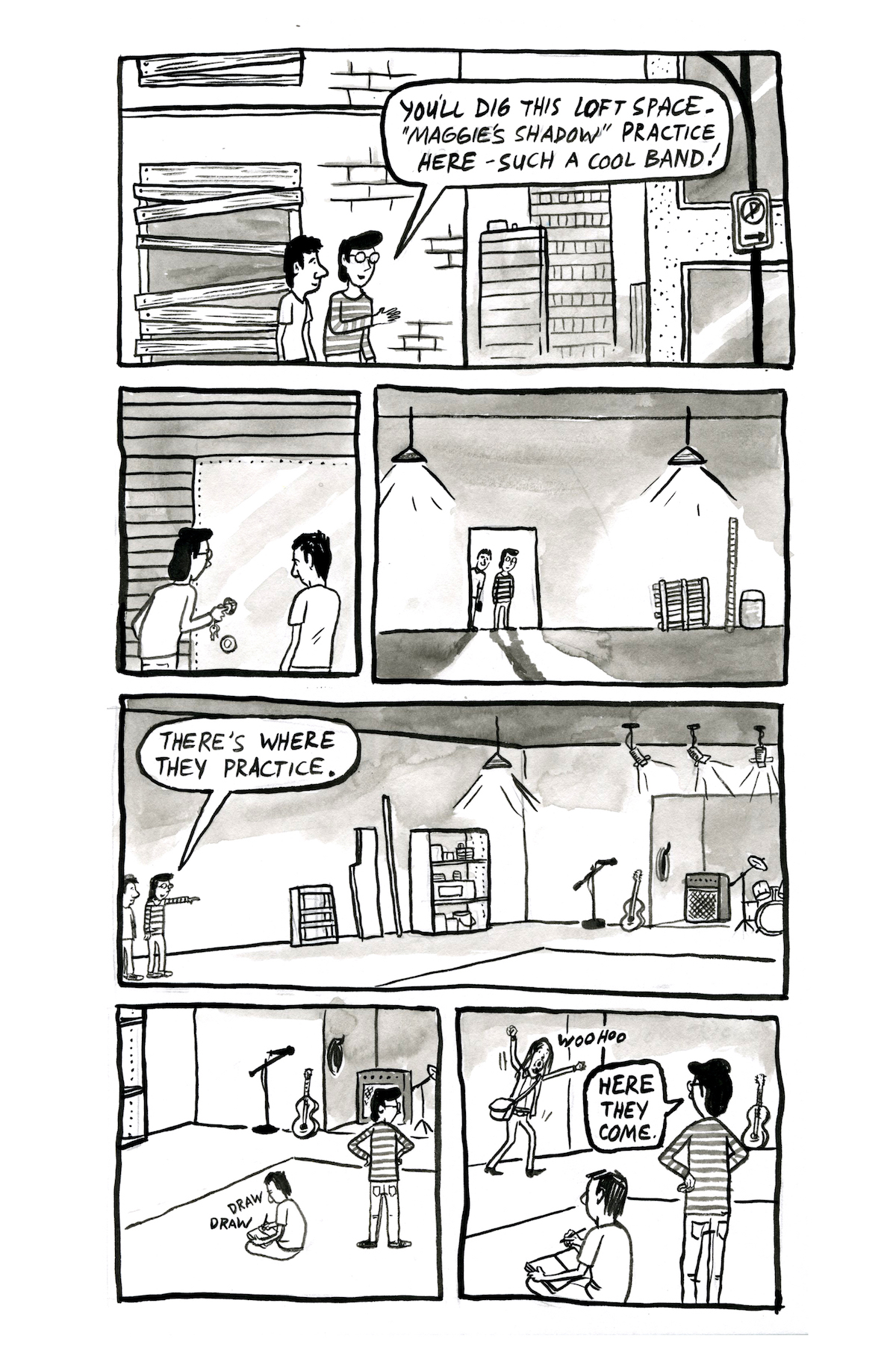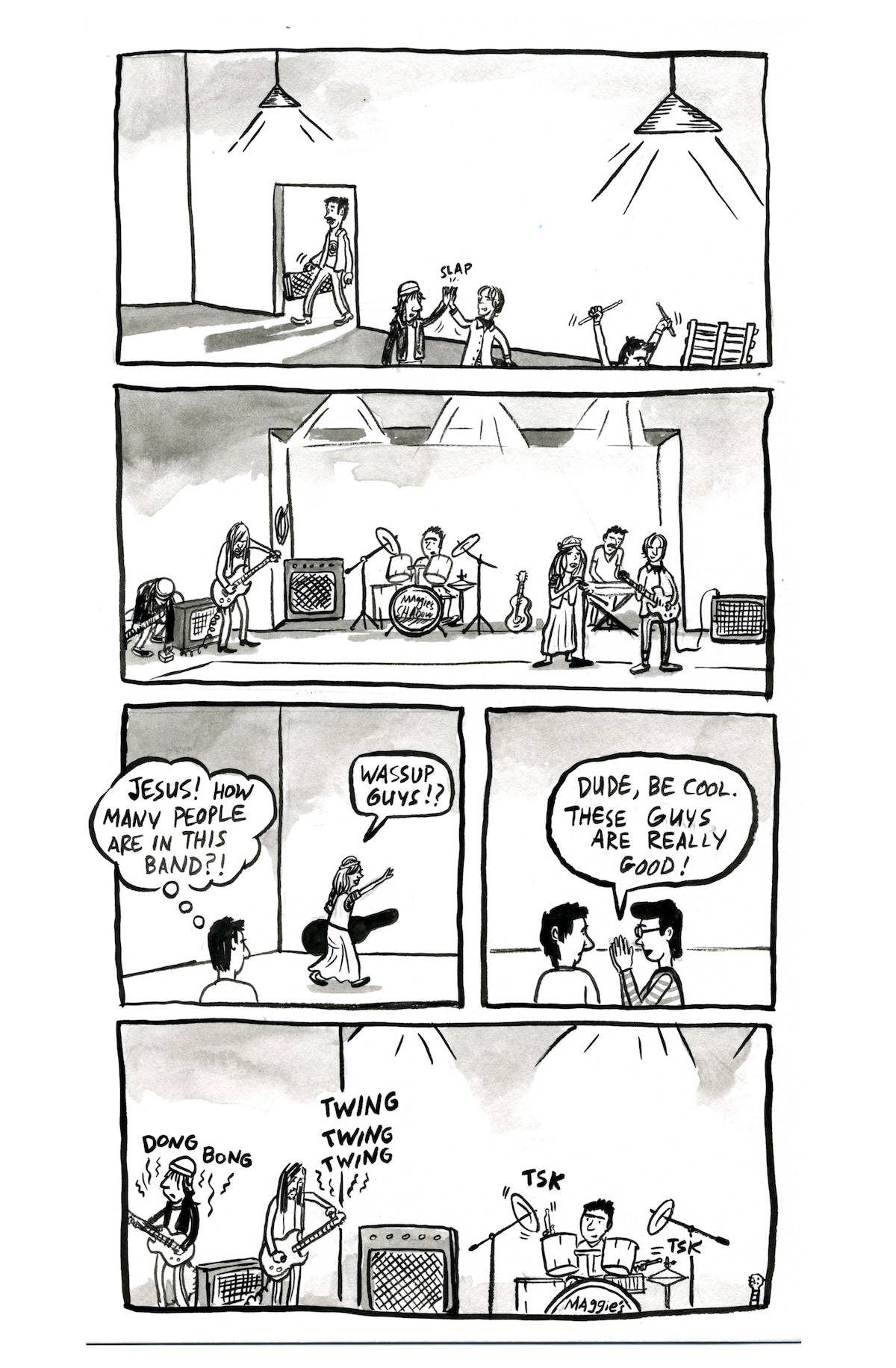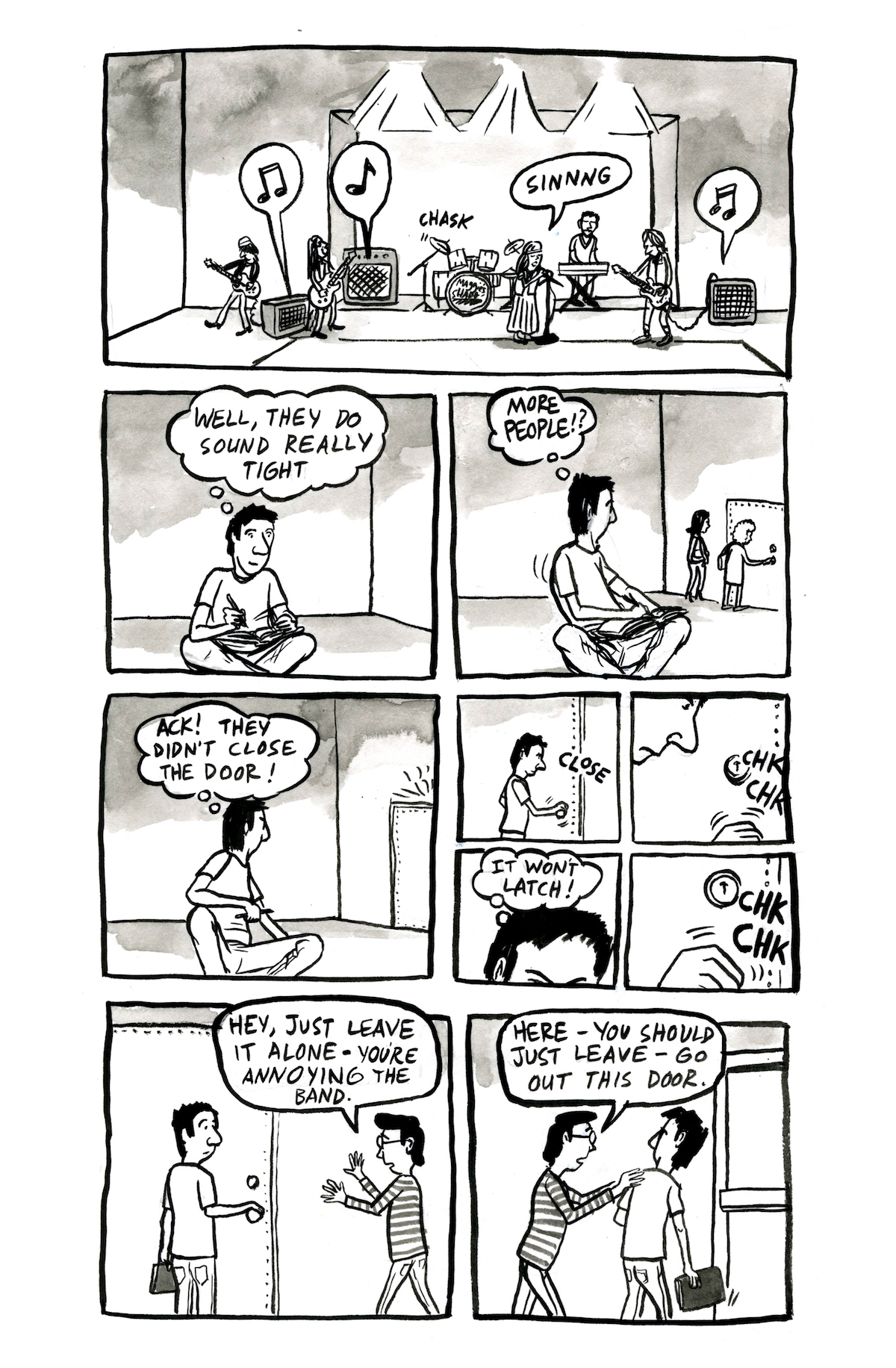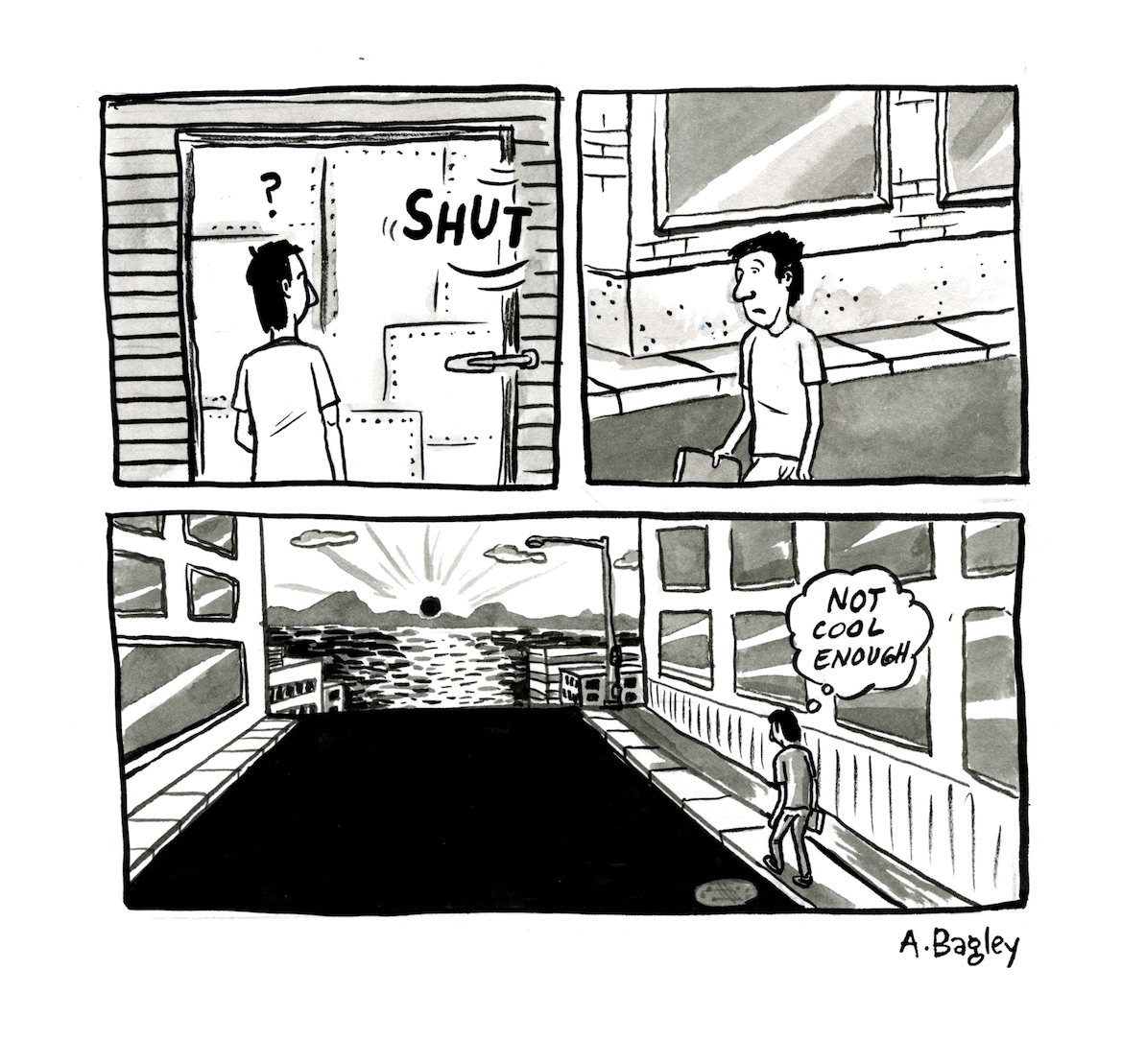Mail Call for January 24, 2018
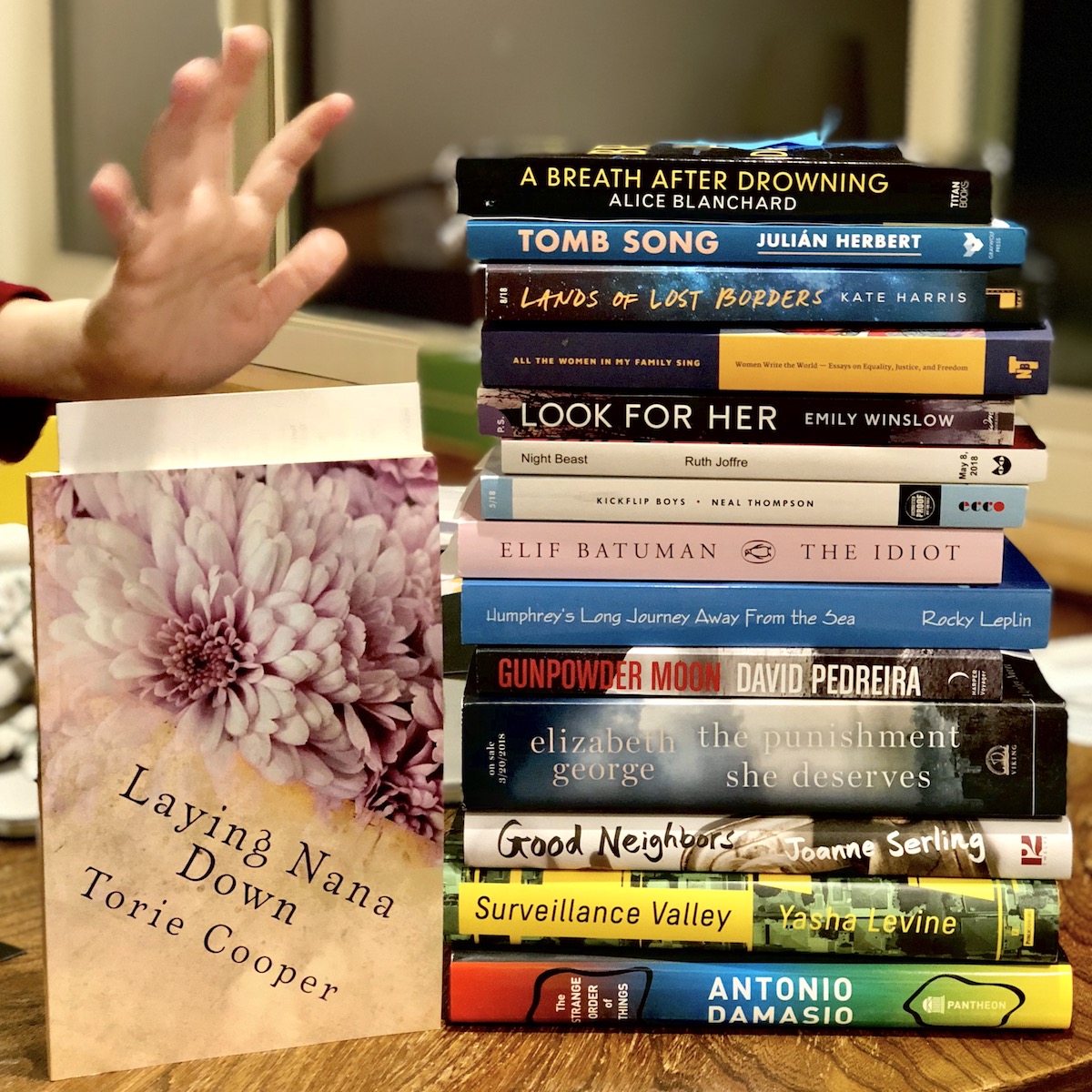
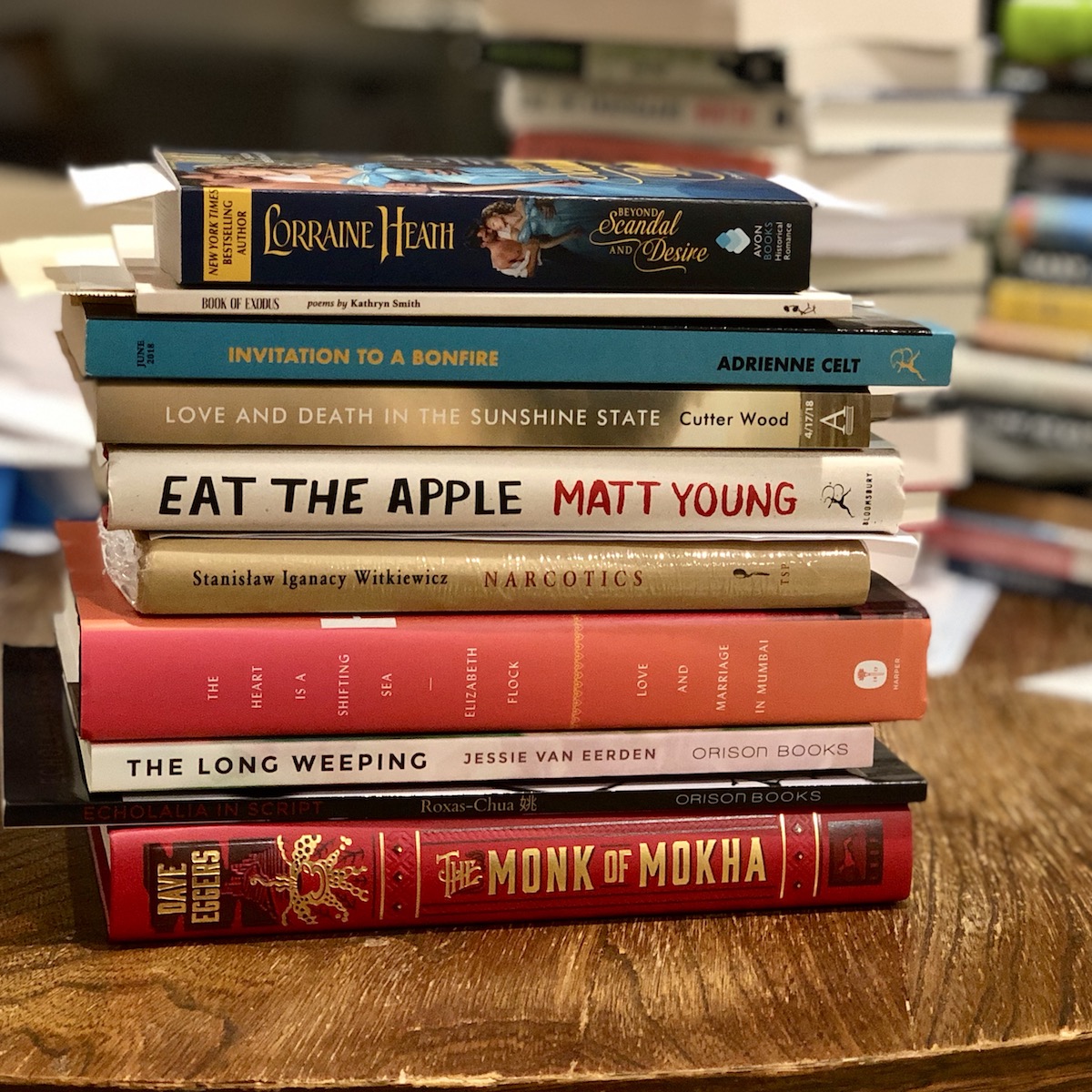
The Seattle Review of Books is currently accepting pitches for reviews. We’d love to hear from you — maybe on one of the books shown here, or another book you’re passionate about. Wondering what and how? Here’s what we’re looking for and how to pitch us.
Getting it right the second time
Last summer, I wrote about The Long Way to a Small, Angry Planet, a sci-fi novel from Portland author Becky Chambers. I gave the book a hard time, chastising it for treading a little too closely to preexisting science fiction tropes. The piece ended, “I breezed through Long Way, but I don’t know if I’m going to be back for the just-released sequel unless I’m assured that Chambers finally takes her crew somewhere new for a change.”
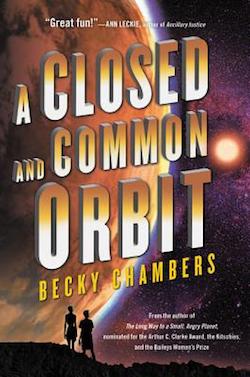
Not long after my post was published, a Seattle Review of Books reader approached us on Twitter — the tweet is lost to the mists of time, sorry — and said that I really ought to consider reading the second book in Chambers’s series, A Closed and Common Orbit. The reader assured me that the second book was entirely different from the first and did not suffer from a lack of originality.
It took me a while, but I finally listened to the audio version of Orbit, and I am so glad that I did. It’s more than just the continuation of a fun series — it’s a rare case of a sequel surpassing the original installment in every single way.
While Planet was a spacefaring adventure story, Orbit is more of a quiet character piece. The book follows two distinct timelines: in the past, a young factory worker is freed from slave conditions and raised to adulthood by an artificial intelligence. In the present, that same factory worker herself becomes an adopted mother figure to an artificial intelligence that recently took up residence in a biological body for the first time.
Orbit is interested in a lot of big issues. It examines what it means to be a self-possessed woman when cultures punish women for demonstrating their autonomy. It focuses on the moment when a child becomes a parent. It wonders at the ways in which women can help each other overcome generational trauma.
With Orbit, Chambers has proven that she is a sci-fi talent who demands to be closely watched. She’s fearless in the way she entirely switches genres between the first and second volume of her series — from space opera to family drama — without betraying the characters or themes of the books.
It’s impossible for me to say for sure, but I think a reader could just start Chambers’s series with Orbit; all the information you need to know is dropped in the first few pages of the second book. But I’d recommend going back and reading Planet in any case: it’s a quick read, and the dramatic evolution from the first book to the second is quite striking. Without the long and bumpy journey of the first book, the deep emotional stakes of the second book might not resonate in quite the same way.
I’m so pleased to have been wrong about Chambers’s goals for the series, and I’m so thrilled that a SRoB reader nudged me in the direction of this remarkable novel about women and mothers and daughters. I can’t wait to see where Chambers goes next.
How we're remembering Ursula Le Guin
When the news broke yesterday that Ursula Le Guin passed away, people around the world responded with a genuine outpouring of grief and disbelief. I can't recall the last time I found myself consoling a weeping person when they heard news of an author's death. That happened yesterday, with Le Guin. Her writing — curious, brave, thoughtful — beguiled generations of readers. She shaped an army of feminists. She inspired young women to demand their place at the table. Her work will guide fiction for centuries.
We'll have more on Le Guin in days to come. For right now, we're just reading all the many beautiful ways people are paying tribute to her life and work.
I recommend that you read John Scalzi on Le Guin at the LA Times:
She was a supporting column of the genre, on equal footing and bearing equal weight to Verne or Wells or Heinlein or Bradbury. Losing her is like losing one of the great sequoias. As the unceasing flow of testimonials gives witness, nearly every lover and creator of science fiction and fantasy can give you a story of how Le Guin, through her words or presence, has illuminated their lives.
I also recommend that you read Julie Phillips's New Yorker appreciation of Le Guin from 2016:
The history of America is one of conflicting fantasies: clashes over what stories are told and who gets to tell them. If the Bundy brothers were in love with one side of the American dream—stories of wars fought and won, land taken and tamed—Le Guin has spent a career exploring another, distinctly less triumphalist side. She sees herself as a Western writer, though her work has had a wide range of settings, from the Oregon coast to an anarchist utopia and a California that exists in the future but resembles the past. Keeping an ambivalent distance from the centers of literary power, she makes room in her work for other voices. She has always defended the fantastic, by which she means not formulaic fantasy or “McMagic” but the imagination as a subversive force. “Imagination, working at full strength, can shake us out of our fatal, adoring self-absorption,” she has written, “and make us look up and see—with terror or with relief—that the world does not in fact belong to us at all.”
And then there are all the ways that people are celebrating Le Guin's life in her own words:
RIP Ursula Le Guin.
— Letters of Note (@LettersOfNote) January 23, 2018
Here she is in 1987, turning down an offer to blurb an all-male sci-fi anthology. https://t.co/rz6Q0jSwWT pic.twitter.com/n3wgHQgDgu
Never forget how much Ursula K. Le Guin hated capitalism pic.twitter.com/rUoI7V17sz
— Laura Hudson (@laura_hudson) January 24, 2018
And I very much enjoyed these ideas to celebrate her life:
some ideas for ways to honour Ursula K. LeGuin:
— neville porg (@neville_park) January 23, 2018
- punch a fascist
- pet a cat
- invent a gender
- join a collective
- have an orgy
- run for city council
- live in the woods
- protest in the streets
- dream
Talking with Andrew Engelson, the publisher of the brand-new Cascadia Magazine
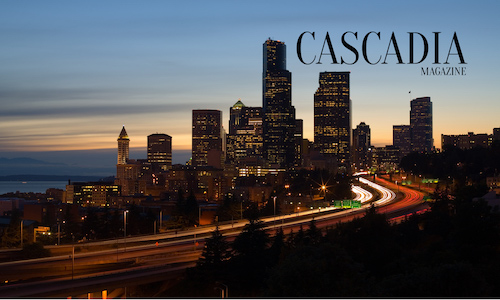
This week, Cascadia Magazine officially published its first online issue. The nonprofit publication promises to cover all of the Cascadian bioregion, and they look to publish "quality journalism, personal essays, arts coverage, environmental reporting, fiction, poetry, and photography you won’t find anywhere else." I talked with the Seattle-based publisher of Cascadia, Andrew Engelson, about why he's starting a magazine in 2018, and what he hopes to do with the publication.
Why start a magazine now? What sort of niche are you filling that's not already being filled?
It feels like an important time to pay attention to quality writing, to something that requires a more time to reflect on than a Twitter post. After the election of 2016, like many of us, I thought long and hard about what I could do that would actually make a difference.
Plus, I’d recently returned to Seattle after living overseas for seven years. And I realized I identified more with Seattle and the Pacific Northwest than I do as being American. In the course of my obsessive reading of the news, I noticed there wasn’t a publication that treated the region as a whole. You’ve got plenty of city magazines and alt-weeklies, and a wonderful assortment of literary journals and presses—but nothing that looks at Cascadia as a single cultural entity.
Uh, didn't you get the memo that magazines are dead?
Yeah, I’ve been notorious in my career for ignoring big trends. Like that time I blew a chance to pursue a job at Amazon in 1997 when they had twelve employees.
But anyhow, I’m very aware that a ton of newspapers and online magazines have folded in the past few years. And the crazy thing is, I believe it’s an exciting time for writing and creative expression. You can do a lot with a small budget, which is why top-heavy media organizations are struggling. I’m optimistic because the Pacific Northwest has no shortage of great readers and talented writers—the trick is finding a financially sustainable way to connect them.
What are you looking for in submissions?
I’m for an eclectic mix: my only standards are that something be well-written and explore an important issue in some depth. I’ve started working with freelance journalists on stories that have a longer shelf life than what you’d normally find at the dailies and alt-weeklies. In terms of essays and fiction—it shouldn’t be too long, and have a sense of urgency and timeliness. As for poetry I’m not committed to any particular style; just that it connects readers in some way to the intensity of experience. Also, I’m committed to seeking out a variety of voices, whether it’s writers who are women, LGBTQ, indigenous, or people of color. Plus I’m interested in hearing from people who live in rural areas or who aren’t from the upper middle class.
What does Cascadia mean to you? The term has been embraced by a bunch of different groups. What are you trying to say with the name?
For me, Cascadia is a bioregion that stretches from Northern California to Southeast Alaska, from the coasts of Washington and Oregon to the mountains of Idaho. It’s a region of 15 million people from many different cultures and experiences. I’m really interested in communicating across that border on the 49th parallel — I find it amazing that people in Seattle know more about the politics and artistic culture of New York City than they do about Vancouver, a city just three hours to the north—and vice-versa. There are a lot of issues that we share in common—the environment being one obvious example. If you have an oil spill in Anacortes, it’s going to effect salmon runs in the Fraser River. As for the Cascadia movement, I’m not especially interested in any sort of political independence, but rather connecting people across an arbitrary boundary.
If they like what they see when they visit your site, what should readers do if they want to support you?
Well, first, we’d love readers to read what we publish. Second, sign up for our free newsletter, Cascadia Daily, which curates news and culture from across the region, and where we’ll let people know when new pieces are published on Cascadia Magazine. And if you like what we’re doing, by all means please go to the website and make a donation. If we want nice things, it’s up to us to financially support the people who create them.
Ursula Le Guin, grand dame of speculative fiction, and resident of Portland, died yesterday at 88, reports the New York Times.
We'll have more to say about Le Guin soon, who was immensely influential in both her writing, and her steadfast approach to the value of books beyond commercialism.
In her 2014 acceptance of the National Book Foundation's Medal for Distinguished Contribution to American Letters, she said:
Books aren’t just commodities; the profit motive is often in conflict with the aims of art. We live in capitalism, its power seems inescapable – but then, so did the divine right of kings. Any human power can be resisted and changed by human beings. Resistance and change often begin in art. Very often in our art, the art of words.
Our sympathies to her family, and to her many friends and fans.
Book News Roundup: Support a cartoonist, say goodbye to Zanadu, and read the fast-food Fire and Fury
Seattle cartoonist Sarah Glidden launched a Patreon. For just a buck a month, Glidden will give you access to her diary comics. Glidden notes that her personal comics lately have been about her pregnancy and impending motherhood, and "I thought it would be nice to have a little more of an intimate space for posting comics of such a personal nature." Glidden has already produced two books of excellent comics journalism, and these personal strips give her an opportunity to share a different kind of story.
Over at Seattle Refined, William Harris mourns the slow passing of downtown comics shop Zanadu Comics. The store closes on January 28th.
At City Arts, Margo VanSynghel interviews Seattle author Ijeoma Oluo, whose book So You Want to Talk About Race was published last Tuesday.
What happens if you load Fire and Fury and a bunch of fast food advertising copy into an artificial intelligence? You get sentences like: "As the Russia investigation seemed to be a problem for Donald, he told Priebus to get fifty more chocolaty-chip cookies shaped like the White House to try to create confusion over which was the one with the President in it."
This, via AbeBooks, is simply stunning:
How bad is it?
Published January 23, 2018, at 11:59am
Over the weekend, a hundred thousand Seattleites took to the streets to protest Donald Trump's presidency. They should arm themselves with a new book that explains every awful thing the Trump presidency has done to date.
Untitled (No Reply)
Oh Wednesday
Full of rain
An argument
With no oneJunk mail
In the mailbox
Hummingbird
In the fall smoke treeWaiting it out
Coffee going
Cold again
In the untouchedCup
My father
Not my father
Gone since JuneHis voice a message
On my phone
Everything
Sounds like rainIn the living room
Of his greeting
When I rewind
Or fast forwardOr gather in stillness
Like smoke
In a hummingbird’s
Tinfoil throatWho would listen
Like the rain listens
Tap tap
Like late seasonApples fallen into
The middle of
This week polishing
Their green disbelief
Don't miss the Feb. 15 application deadline for Mineral School residencies

Visit our sponsorship page for more details and a link to the application form. Or meet Mineral School in person on January 28, at the Seattle Public Library's Residencies Revealed event. They'd be delighted to see you!
Sponsors like the Mineral School make the Seattle Review of Books possible. Did you know you could sponsor us, as well? If you have a book, event, or opportunity you’d like to get in front of our readers, reserve your dates now.
Your Week in Readings: The best literary events from January 22nd - January 28th
Monday, January 22: The German Art of Raising Self-Reliant Children Reading
Apparently, German parents let their kids do anything up to and including running around cities unsupervised and playing with knives. So why isn’t a wave of juvenile delinquency wracking Germany? Apparently, it comes down to selbstandigkeit, which translates as “self-reliance.” Parents who are interested will find a lot to think about here. Westside School, 10404 34th Ave SW, 7 pm, $5.Tuesday, January 23: This Is How It Always Is Reading
See our Event of the Week column for more details. Seattle Public Library, 1000 4th Ave., 386-4636, http://spl.org, 7 pm, free.Wednesday, January 24: Shari'ah on Trial Reading
Evergreen State College, professor Sarah Eltantawi debuts her latest work of Islamic studies, Shari'ah on Trial: Northern Nigeria's Islamic Revolution. If you’re among the majority of Americans who know little about Islam and/or Africa, you should attend this reading. Elliott Bay Book Company, 1521 10th Ave, 624-6600, http://elliottbaybook.com, 7 pm, free.Thursday, January 25: The Wizard and the Prophet Reading
Feuding 20th century scientists Norman Borlaug and William Vogt sound like a pair of genuinely fascinating men. Charles Mann’s new book details the ongoing battle between the two scientists, and how this schism is affecting our understanding of the world even today. Pigott Auditorium, Seattle University Campus Walk, 652-4255, http://townhallseattle.org, 6 pm, $5.Friday, January 26: Best New Poets Reading
Join the best poetry bookstore in town as they celebrate the 2017 Best New Poets anthology with local contributors including Sarah Bates, Christina Im, Erin L. McCoy, Alyssa Ogi, Caitlin Roach, and Amanda Turner. New poets should be everyone’s business. Open Books, 2414 N. 45th St, 633-0811, http://openpoetrybooks.com, 7 pm, free.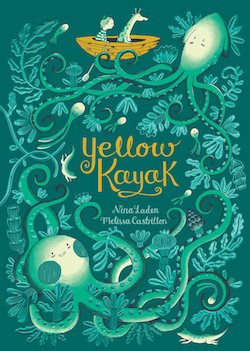
Saturday, January 27: Yellow Kayak Reading
Nina Laden reads from her latest children’s book about friendship, adventure, and the importance of bravery. The illustrations by Melissa Castrillon are incredibly gorgeous. Third Place Books Ravenna, 6504 20th Ave NE, 525-2347 http://thirdplacebooks.com, 11 am, free.Sunday, January 28: Seattle Writes: Residencies Revealed
Representatives from five writing residencies will talk about what they’re looking for in writers and which residency is right for you. Bring all your residency-related questions to this one. Maybe this will be the year you score a fabulous will share information on what they offer writers as well as tips for the application process. Bring your questions and don't let go of that dream of finding uninterrupted time to write.
Seattle Public Library, 1000 4th Ave., 386-4636, http://spl.org, 2 pm, free.
Literary Event of the Week: This Is How It Always Is paperback release reading at Seattle Public Library
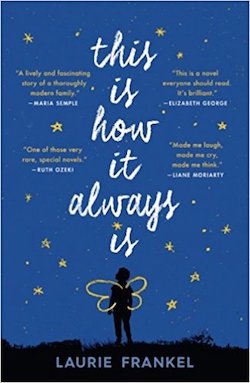
If that assessment is true—and I believe it is—Frankel’s novel, This Is How It Always Is, definitely belongs in paperback. This is a novel that should be discovered and read by a very wide audience—preferably one that has no idea what it’s getting into. Always is a novel about a family that must change and adapt when one of the children realizes she is transgender.
Unlike most American families in literature, the family in Always is supportive and kind and loving. They adapt to the change, mostly, with good humor and an abundance of love. This is a book that can change hearts and win over minds precisely because it’s so warm and friendly that it throbs empathy like a beating heart.
Tomorrow night at the downtown branch of the Seattle Public Library, Frankel debuts the paperback collection of Always to a warm hometown crowd. Frankel confided that the paperback edition was causing more than a little anxiety in her life, precisely because it is likely to be read by a wider, and more unsuspecting audience. She told me that the book had already inspired “a not insignificant amount of hate mail and death threats and that sort of thing,” and she expected the lower price point to draw out more of the same.
I suspect that a lot of that hate mail came from people who didn’t read Always; most of the haters likely read that the book was about a transgender child and responded with outrage. I also suspect that if most of those so-called defenders of decency actually bothered to read Always, they might likely find themselves won over to Frankel’s side. Always is a book about a mother’s love for her child, and even in these hyperpartisan times, that’s still a relatively uncontroversial subject. This is a book that will likely charm a lot of people who need to be charmed, and for that reason it’s a book that deserves to be in front of a much wider audience.
Seattle Public Library, 1000 4th Ave., 386-4636, http://spl.org, 7 pm, free.
Meet the new Hugo House — and learn how you can help make it happen

“All our legislators have just been fabulous” in their support of the organization, Hugo House Executive Director Tree Swenson tells me over the phone. “All three of our representatives — Nicole Macri, Jamie Pedersen, and Frank Chopp — have all been amazing. The Hugo House adores all of them.”
A little bit of backstory: In May of 2016, the old House — built from an old funeral home facing Cal Anderson Park on Capitol Hill — closed its doors forever. For the last year and a half, a construction team has been building an apartment building on the site, with ground-floor retail space that was intended to be the new Hugo House.
This grant money puts the House on track to be complete by this coming summer. But now they need your help to fill in the final gaps.
You can see the plans for the new Hugo House online. It’s really something: 9,600 square feet of arts space including a 150-seat theater, a garden patio, a bar with plenty of cozy alcoves for writing, a cabaret space, six classrooms allowing the House to serve about half again as many students as before. Best of all, the whole space is finally ADA-compliant, meaning that everyone in the community can take part in every event the House puts on. The designs, by Seattle architecture firm NBBJ, incorporate elements from the original House (floorboards from the old building — complete with words drawn on them during the raucous closing-week party in May of 2016 — will make up the bar in the new space.)
Now that the grant has come through, Swenson says the new space “feels more real,” and she’s really getting a sense of what it will be like to walk around NBBJ’s designs. “It feels like a space that is so creative,” she gushes. “It feels like something creative must happen there, and I think that's so awesome.”
That one million dollars from the state puts the house within 90 percent of its final goal. Now they’re making an appeal directly to you. “At this point, we need everyone in the community to give as generously as they possibly can to help us complete this project,” Swenson says.
You can donate to the House through the New Hugo House site. Swenson thinks the designs of the new building will excite the community enough to get the project across the finish line. “I know there are a lot of people who really care about Hugo House whose lives have been changed by experiences they've had there— a lot of writers whose work has been formed and shaped there,” Swenson says. “We're counting on this community to pitch in to help us get to the final goal in the campaign.”
For me, the most exciting part of the new designs is the salon and stage in the picture at the top of this post. It’s a relatively small space — I expect the theater will be put in use for most of the readings at the new Hugo House — but I love that it’s so outward-facing, that it practically spills events out onto the street. It’s what you want a writing center to be: a house, yes, where people come to be comfortable, but also a place that’s reaching outward, inviting everyone to take part.
For the last year and a half, the Hugo House has operated out of temporary quarters — the building generously provided by the Frye on First Hill for instance, and the Fred Wildlife Refuge for big events. That’s been a great thing for the organization, Swenson tells me. It’s introduced the House to people who otherwise never would have known about it. But now it’s time for the community to come together one more time and help the House come home.
The Sunday Post for January 21, 2018
Each week, the Sunday Post highlights a few articles we enjoyed this week, good for consumption over a cup of coffee (or tea, if that's your pleasure). Settle in for a while; we saved you a seat. You can also look through the archives.
The Awl and the Hairpin’s Best Stories, Remembered by Their Writers
If you don’t get any farther in today’s Post than this “best of” the Awl and the Hairpin, selected by writers and editors from both blogs, that’s okay. I almost stopped there, too. Mixed in with dozens of links to hilarious, moving, smart, offbeat writing are elegies for the sunsetting sites. Some are nostalgic; others are righteously angry — Sam Biddle’s, for example.
DCist, the first place that ever published something I wrote, was recently killed by a spiteful billionaire. Gawker, the first place that ever paid me to write, suffered the same fate about a year earlier. Now the Awl, the first website that took a chance on publishing me when I was just some dipshit recent college grad (I am now a dipshit 31-year-old) is dead, not directly at the hands of a billionaire, but in part by the stupid, fucked-up publishing ecosystem that tech billionaires have helped build. I guess the lesson here is try to be a billionaire if you can.
In The Midst Of #MeToo, What Type Of Man Do You Want To Be?
On the anniversary of the Women’s March, Andrew Sullivan wrote that being an asshole is a biological imperative. Ijeoma Oluo did not write a rebuttal, but her recent essay on male choice might as well be one.
As I watch countless men (and sadly, quite a few women) jump to the defense of other men who have been outed for their coercive, demeaning, and abusive behavior towards women; as I watch them debate the fine points of whether or not a woman said no loud enough, whether her “I’m not comfortable” was strong enough, whether she was at fault for being mistreated by not yelling, or hitting, or running — I want to ask them all this question: Is this the type of man you want to be?
Sudden urge to put Sullivan in a room with Oluo and wait for her to come out alone. Sudden, better urge to put Sullivan in a room with James Damore and lock the door forever.
The diabolical genius of the baby advice industry
Oliver Burkeman’s essay on books that teach parents how to rear their children is blood-curdling. The entire genre seems based on the vulnerability of new parents who are, seemingly, a desperate and wild-eyed lot, all-too-easy to convince that one misstep will ruin your child for life. Thank heavens cat and dog people are free of any such neuroticism …
What I didn’t yet understand was the diabolical genius of the baby-advice industry, which targets people at their most sleep-deprived, at the beginning of what will surely be the weightiest responsibility of their lives, and suggests that maybe, just maybe, between the covers of this book, lies the morsel of information that will make the difference between their baby’s flourishing or floundering. The brilliance of this system is that it works on the most sceptical readers, too, because you don’t need to believe it’s likely such a morsel actually exists. You need only think it likely enough to justify spending another £10.99 on, oh, you know, the entire future happiness of your child, just in case.
Too Much Music: A Failed Experiment In Dedicated Listening
James Jackson Toth’s 2017 resolution — listen to a single album, and only that album, for every week of the year — died quickly and amusingly. But his take on how the internet has changed his relationship to music, with implied parallels to the problem of curating and consuming words, is interesting. And yes: algorithms can be magical, but I still like humans best.
Missing from a larger discussion is the radical idea that maybe it is the consumers who are being done the greatest disservice, and that this access-bonanza may be cheapening the listening experience by transforming fans into file clerks and experts into dilettantes. I don't want my musical discoveries dictated by a series of intuitive algorithms any more than I want to experience Jamaica via an all-inclusive trip to Sandals.
The Things That Come to Those Who Wait
The queue, as considered by Jamie Lauren Keiles, is an engine of desire and a microcosm of social hierarchy, competition, and collaboration. A gently serious piece about mostly lighthearted things — cronuts, iPhones, and sneakers — and how we give them value by our willingness to wait.
I’m left to keep up with the latest desserts through the Instagram posts of a random teen I’ve followed online for the last three years. This past summer, she visited New York and waited in line at a place called Dō, a “confection” shop near NYU that sells raw cookie dough in spoonable cups. A few weeks ago, I visited the shop, hoping to enjoy the society of its line and try its pasteurized (though questionable) product. But arriving at the shop on a weekday afternoon, the line I sought was nowhere to be found. Two French tourists dawdled out front, enjoying their bowls of uncooked dessert. I looked through the window at the empty café. It felt pointless to spend the $4 without waiting.
Whatcha reading, Lauren Cerand?
Every week we ask an interesting figure what they're digging into. Have ideas who we should reach out to? Let it fly: info@seattlereviewofbooks.com. Want to read more? Check out the archives.
Lauren Cerand is a literary publicist extraordinaire, PR rep, and strategic consultant based out of New York (and, full disclosure, a previous sponsor of the SRoB). She's working on great stuff this year: new works by Tayari Jones, Molly Crabapple, Daniel Handler (as well as Lemony Snicket), the Windham-Campbell Prizes, and Relegation Books.
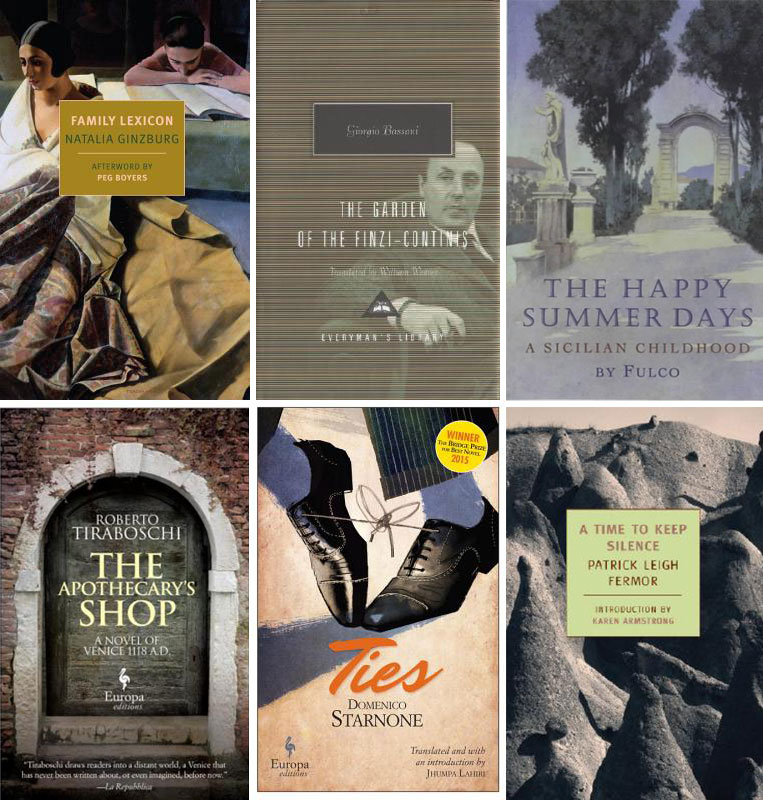
What are you reading now?
I have been learning Italian — going to weekly language and conversation classes — for about six months, so I try to read Italian literature and books about Italian culture as often as I can. Right now I'm reading Natalia Ginzburg's Family Lexicon (NYRB Classics), which reminds me in some ways of The Garden of the Finzi-Continis, a novel that absolutely floored me in its depiction of a world of desire and fantasy encroached upon by malevolent forces. Family Lexicon in that in-between genre that we don't have so much here in America, a bit like French auto-fiction, where some elements are obviously novelistic and some are true and even more so, it's not really the point of the exercise. We tend to be obsessed with the idea of an objective truth to the exclusion of all else. The story is about a family living in Turin, their secret jokes and typical idiosyncrasies, and what their anti-fascism will cost them. Right now it's still early in the book, and the heroine's observations about her family, and how they might be different than other families, are richly layered with cultural and historical significance that I'm still puzzling out, sort of like when reading Georges Perec's "I Remember". So I'm taking this one slow, even though it's not a terribly long text.
What did you read last?
Owing to the aforementioned interest in Italian culture, I recently read a mystery, which I wouldn't normally gravitate to in other circumstances. It's called The Apothecary's Shop by Roberto Tiraboschi, and it was published by Europa Editions, which also put out Ties by Domenico Starnone, a novel of a marriage and family relationships that are not what they seem in retrospect. I read that a few weeks back and loved it (and which won a prize like, the next day, so I felt very clever for a moment with my morning coffee). In The Apothecary's Shop, the setting is Medieval Venice, not at all a period that I know much about. It's an extremely elegant intrigue, with cosmopolitan influences that reflect the character of the city, several unlikely plot twists, and the panache to put just enough confidence in the mind of the reader to keep the pages turning quickly. All of the characters are very strange in their own ways and very believable, and fans of Game of Thrones and all of the Law & Order type franchises would really enjoy this one. I thought I knew much more than I did, and discovering how small my vision was delighted me in the end. When I was in Venice in August, I sat for awhile in a garden on the island of Murano, and although it is small, uneventful memory in many regards, it is also a fully-formed one, and this novel was a window into things that might have plausibly happened there a millennium ago.
What are you reading next?
Right now I am waiting for a used copy of The Happy Summer Days: A Sicilian Childhood by Fulco Santostefano della Cerda, Duke of Verdura, who designed jewelry for Chanel, including her iconic Maltese Cross cuffs, and then under his own name, Verdura, inspired by natural motifs, to arrive in the mail. While I'm passing the time, I'll re-read Patrick Leigh Fermor's A Time to Keep Silence, a memoir of retreats spent writing and reflecting in monasteries across Europe. When I was reading Adam Federman's terrific biography, Fasting and Feasting: The Life of Visionary Food Writer Patience Gray last month, the quotable electric zing of her letters ("Everything that grows has its peculiar grace."), her commitment to personal originality, and her wandering ways reminded me Fermor, and so I went to find the book of his that I own on my shelf, and wouldn't you know, it's just the right one.
The Help Desk: Do only terrible men write books about terrible men?
Every Friday, Cienna Madrid offers solutions to life’s most vexing literary problems. Do you need a book recommendation to send your worst cousin on her birthday? Is it okay to read erotica on public transit? Cienna can help. Send your questions to advice@seattlereviewofbooks.com.
Dear Cienna,
With all the harassing men in the media lately, I’ve been thinking a lot about this: where does the line between art and real life fall? Woody Allen keeps making movies about older men fucking younger women. Louis CK told hours of jokes about being a shit to women. Bill Cosby joked about giving roofies to women decades ago.
At some point, we have to realize that a writer who writes about treating women horribly is probably pretty likely to treat women horribly, right? I mean, I’m not saying that they should be locked up or anything, but women would be smart to avoid authors who write approvingly about being monstrous harassers, wouldn’t they?
The easy response would be to say that by that logic we should peremptorily jail mystery writers for murder, but that’s not right. Most mystery novels come down on the side of murder being a bad thing. I’ve read books by male authors that straight-up glorify misogyny. I know I would discourage my daughter from taking a class with those authors if the opportunity arose. Am I being alarmist? Do I even have a question or am I just blowing off steam at the horror show that is the news? You decide!
Kristen, Judkins
Dear Kristen,
I'd like to agree with you. It would make life simple if we could pass sweeping moral assumptions about artists based solely on their work. But that's not – or shouldn't be – the role of art.
To me, good art pushes its audience to think about aspects of humanity in ways they have never previously considered, or points out beautiful or horrible trends in our culture that deserve scrutiny or celebration.
Have you read Rabbit, Run? That's a pretty great example of a total shitbag character who peaked in high school and has no respect for women. However, through Rabbit, John Updike explores themes of alienation and the idea that American men aren't socialized with the vocabulary to express their emotions and basic desires (among other things).
It would be a shame if artists shied away from exploring and commenting on the world because they feared retribution. So how do we navigate art that makes us uncomfortable — and how should we approach the people who create that art? Here are two thoughts:
The men you all mentioned had autobiographical or confessional aspects to their work, but those weren't the dog whistles telling the world that they were alleged shitbag predators and perverts. The dog whistles were the scores of women who reported them as predators and perverts and were ignored for years. We seem to be on a path to listening to victims and taking their accusations seriously – investigating and when warranted, prosecuting them. I hope this trend continues, and it should affect their standing as artists.
Here is my second thought: I try not to read books that employ lazy misogyny or treat women as one-dimensional plot devices for men. How? I read book reviews and I take book recommendations from friends. (With movies, I try and consult the Bechdel test. And I avoid most stand up comedy.) Criticism is underappreciated but vital. Good critics evaluate what an artist was trying to do with their work and whether or not they succeeded in it. Great critics will follow an artist's oeuvre and point out weaknesses or troubling trends in their work, such as portraying women as tools rather than human beings. (That still doesn't mean that an artist views all women as tools. It could just mean that the artform they have devoted their lives to, and the mentors they have studied under, are steeped in misogyny that they may have to consciously remove themselves from. Unfortunately, women have been used as little more than narrative tools in most artforms – the archetypal victim who must be saved/avenged, the pure virgin who's a prize to be won, the heartless slut/seductress – for-basically-ever. It will take awhile to dismantle those constricting lady-shaped boxes.)
This is a bummer of a topic that I, along with many people, have struggled with. But it's a good struggle, like the struggle to remove the sweat from your third eye after a particularly intense bout of astral projecting yourself to Bill Cosby's house to take ghost shits on his pillow and chant "soon you will die and the world will be better for it" in his ear all night as he sleeps.
Kisses,
Cienna
Portrait Gallery: Carmen Maria Machado
Each week, Christine Larsen creates a new portrait of an author for us. Have any favorites you’d love to see immortalized? Let us know
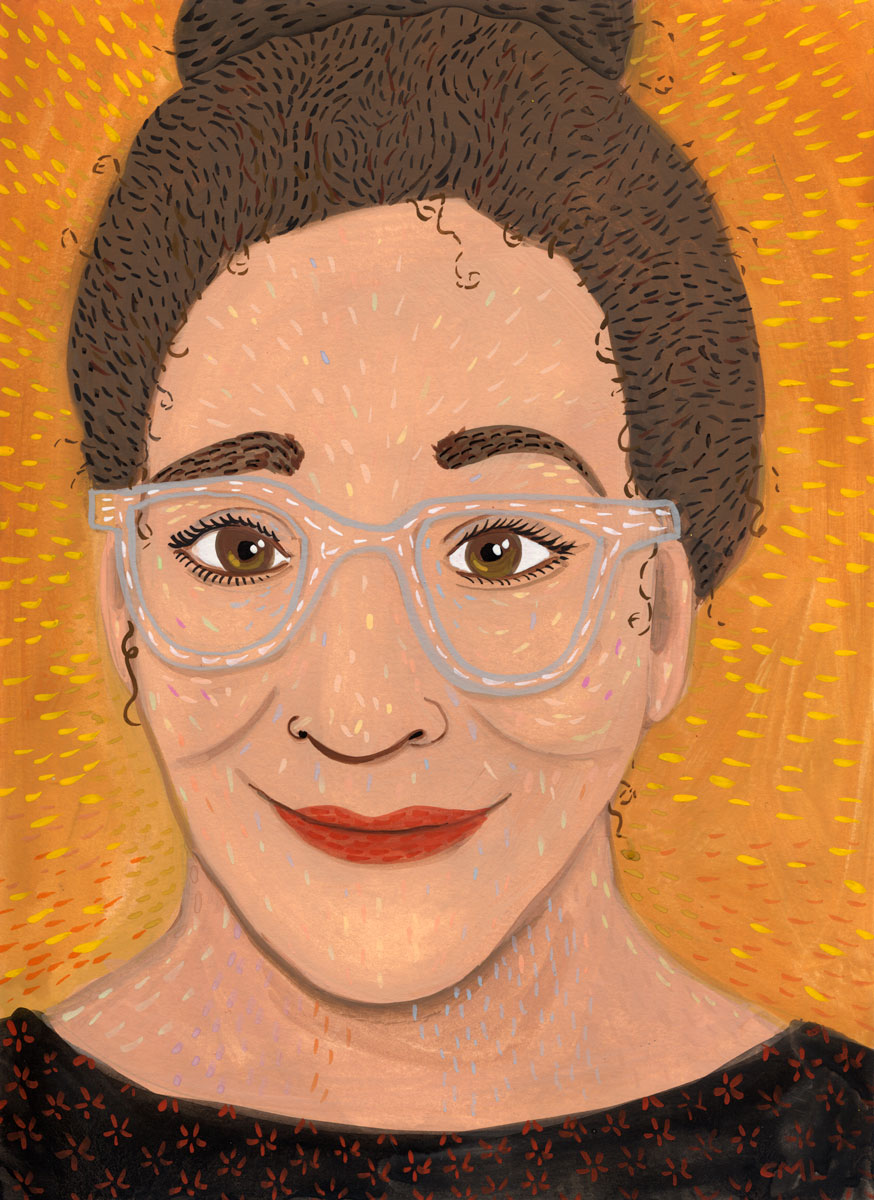
Thursday, January 18: Her Body and Other Parties Reading
Author Carmen Maria Machado reads from her celebrated debut collection of short stories, Her Body and Other Parties. It’s a book that crosses lines from sci-fi to horror to thriller to odd Law & Order: Special Victims Unit parodies.
Seattle Public Library, 1000 4th Ave., 386-4636, http://spl.org, 7 pm, free.
Thursday Comics Hangover: I'd buy that for a dollar (and fifty cents)
Last year, small press comics publisher Alterna Comics began publishing a line of cheap comics. Printed on flimsy newsprint, these books sold for $1.50 a pop — about half the price of the cheapest monthly comics published by the big two mainstream publishers.
Unfortunately, most of what I've seen from Alterna Comics hasn't blown me away. One comic, Amazing Age is clearly playing for a noxious kind of superhero nostalgia. It reads like a Marvel Comic from the 1980s with worse art — full of self-referential superhero action with no depth or consequences. The comic appeared to be designed to appeal to the grown men who remember spending $1.50 per issue on comics, and really nobody else.
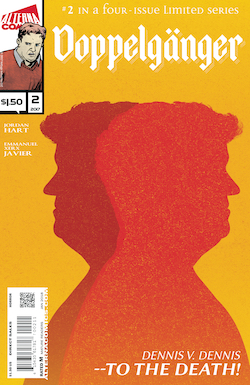
But at least one of Alterna Comics's line has very much impressed me with its wicked sense of genre fun. Written by Jordan Hart and illustrated by Emmanuel Xerx Javier, the four-issue miniseries titled Doppelgänger tells the story of a bland computer programmer named Dennis who finds himself copied by an ancient, evil magical creature. The Dennisgänger takes over Dennis's suburban life, sleeping with his wife and playing role playing games with his friends.
The second issue of Doppelgänger landed yesterday, and it's everything you'd want in a second issue. The book doesn't waste any time spinning its wheels, instead launching forward into Dennis's plan to take his life back. Meanwhile, the Dennisgänger begins to assert himself in dynamic ways at Dennis's job. The two are hurtling toward each other, and it's a real pleasure to know that the storytellers aren't going to waste their readers' time in the telling of the tale.
Doppelgänger is fantastic, pulpy fun — a dark fantasy thriller that seems to be hurtling toward a conclusive ending. I'd be thrilled to buy it at three times the price. At a buck fifty an issue, I'm not sure why it's not on the bestseller charts.
Book News Roundup: Dune Night redux, Seattle Public Library gets nerdy, and more
If you follow comics in Seattle, you probably know about Dune Night, the comics jam that happened regularly at Cafe Racer. Since the future of Cafe Racer is in doubt, Dune Night has been on hiatus. But there's no room for a hiatus in our hearts! Tomorrow night, the Leary Traveler in Ballard presents an art show of some of the best Dune Night pieces from 6 to 9. Expect many Duners (Duniacs? Dunes and Dunettes? Artists who have created work at Dune Night?) to be in attendance. The show will be up at Leary Traveler for at least a month.
Shelf Talk, the Seattle Public Library's blog, interviewed new Seattle City Councilmember Teresa Mosqueda about the book that has been most influential in her career.
Emerald City Comicon is teaming up with the Seattle Public Library to bring comics education-themed programming to the library on Thursday, March 1st, including a number of panels on how to incorporate comics into literacy programs. ECCC says "An ECCC Professional Badge is required to attend ECCC at The Seattle Public Library. Pro Badges are free of charge to educators and librarians."
Bookselling Without Borders is now providing a scholarship to "send booksellers on all-expenses-paid trips to the world’s premier book fairs, including the Turin Book Fair, the Frankfurt Book Fair, and the Guadalajara International Book Fair." They are accepting scholarship applications between now and February 28th. If you're a bookseller and you'd like to connect to the larger international bookselling community, you should apply.
You have to stop letting Facebook tell you what to read
A few years ago, publishers allowed Facebook to become basically their sole source of traffic. Now, Facebook is cutting traffic to news feeds in an attempt to staunch the flow of fake news.
A couple of years ago, brainy blog The Awl moved all their pieces over to blogging site Medium, presumably in search of a business model that would sustain the site. (You don't change everything about your publishing model unless your publishing model needs serious help.) Last year, The Awl divorced from Medium and went solo again. This month, The Awl will close entirely. I very much enjoyed The Awl, which was basically a smarter, more patient, better-written Gawker. And now it is dead.
Look, friends. I don't want to make you feel guilty, but if your internet experience begins and ends with Facebook, this is kind of your fault. You own some of this.
Here's what I think you should do, instead: find an RSS reader that works for you. I pay for NewsBlur, because it's a great service and I like paying for services that I want to stay around. It's not based on a super-sketchy advertising model. There are some free RSS readers out there, though.
Once you choose an RSS reader, you should subscribe to the news sites that you like. Then, get into the habit of checking your RSS feed throughout the day. Don't feel as though you have to read everything; think of it as an email inbox. Some of it is obviously not interesting or relevant to you. Delete with abandon.
And if you're a writer: start a blog. Write about what you're interested in. Be plucky. Be opinionated. Don't have hot takes, though — cultivate some beats. Write about things you care about, ignore the rest. If you have other friends who write blogs, you should team up with them and make a bigger blog. Write well. You'll attract readers. And you should promote the writers and sources you like, too.
Look, if we learn nothing else from the 2016 elections, it should be this: what we read is way too important to leave up to anyone else. When we allow someone else to control our media intake, we're giving up a tremendous amount of power. We've got to take that power back.
